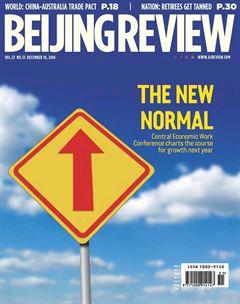FILM PRODUCER AWARDED
Zhang Xun, General Manager of China Film Co-production Corp. (CFCC), was honored with the Gillo Pontecorvo Award for her contributions in the area of co-producing movies with foreign countries on December 1 by Italian Ambassador to China Alberto Bradanini. Zhang is the first Chinese winner of this award.
Zhang started her film career in 1979 in the marketing department of Beijing Film Studio. Several years later, she entered CFCC, starting overseas film co-production. Zhang has been general manager of CFCC since 2007 and has been responsible for the global distribution of over 300 Chinese and co-produced movies, including Crouching Tiger, Hidden Dragon; CJ7; and King of Beggars. In addition, she has been in charge of managing and coordinating Chinas film co-production with other countries in movies such as Looper and The Crossing.
The Gillo Pontecorvo Award, established in 2002 by late Italian film director Gillo Pontecorvo, is designed to encourage outstanding moviemakers around the world.
China-Pakistan Economic Corridor
Oriental Outlook december 11
By September, deals on the projects making up the China-Pakistan Economic Corridor had been inked between the two countries involved. The concept of the economic corridor was initially put forward by Chinese Premier Li Keqiang while visiting Pakistan in May last year.
China and Pakistan have formulated plans to build roads, railways, oil and gas pipelines, and optic cables running from Kashgar in northwest Chinas Xinjiang Uygur Autonomous Region to Gwadar Port in Pakistan. The corridor incorporates 30 large projects with total investment of $32 billion.
The projects will be divided into three groups with the first group to be finished by 2017, the second to be finished by 2020 and the third between 2025 and 2030. Energy infrastructure projects will be accorded top priority because Pakistan is in severe shortage of electricity. The second most important task is the construction of transportation infrastructure.
Once completed, the corridor will not only become an important channel connecting China and Pakistan, but also benefit the approximately 3 billion people living in China, South Asia, Iran and the Gulf region. It will function as a channel for China to get oil and gas from the Gulf. Currently, China relies on the Strait of Malacca to transport energy supplies from the oilrich region, a route that involves many security risks.
Rethinking Physical Checkups
China Newsweek december 1
In China, clinics and hospitals offering physical checkups are thriving, along with the rising public awareness of the importance of receiving regular checkups. In Beijing alone, 204 medical institutions, both private and public, are authorized to carry out checkups and medical staff working in the industry have reached nearly 10,000.
In addition to private institutions, public hospitals have also set up their own health checkup centers. The profit level of the industry has reached 20 percent and checkups now constitute one of the main sources of a hospitals income.
For those diagnosed with chronic diseases, it is necessary to receive checkups regularly. For instance, those with high blood pressure should check it regularly and receive ECG and urine tests to see whether or not the disease has caused damage to the heart or kidneys. For healthy people, checkups may offer an opportunity to communicate with doctors and receive advice concerning diet, physical exercises and healthy lifestyles. Above all else, prevention is better than cure.
However, some experts warn that health checkups may not be useful as previously thought, and may even prove harmful. They have cautioned that physical checkups may have unintended side effects. For example, certain physical indexes of healthy people may be erroneously identified as abnormal during a checkup, causing unnecessary concern. Repeated checkup procedures such as X-rays and CT scans could potentially harm the body.
Suicide Prevention Measures Needed
China Youth Daily December 9
On November 30, 19-year-old Zeng Pengyu from Luzhou, southwest Chinas Sichuan Province, broadcasted live the process of him committing suicide on his microblog. He posted photos of a stove with coal burning inside which he intended to use to suffocate himself alongside descriptions of the process.
His posts soon received massive attention in cyberspace, with some calling the police and trying to dissuade him from suicide, some suspecting that the whole exercise was a ploy to grab attention and others encouraging him to kill himself. Zeng finally died of overdose of sleeping pills combined with excess inhalation of carbon monoxide from the burning stove.
Many blamed the Internet users for having prompted the young man to kill himself. Its undeniable that the indifference shown by some toward the incident is extremely unpalatable. However, it would be unrealistic to expect microbloggers to be capable of effectively foiling a suicide attempt.

